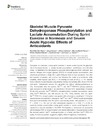Identificador persistente para citar o vincular este elemento:
https://accedacris.ulpgc.es/jspui/handle/10553/41853
| Título: | Skeletal muscle pyruvate dehydrogenase phosphorylation and lactate accumulation during sprint exercise in normoxia and severe acute hypoxia: effects of antioxidants | Autores/as: | Morales-Alamo, David Guerra, Borja Santana, Alfredo Martin-Rincon, Marcos Gelabert-Rebato, Miriam Dorado, Cecilia Calbet, Jose A. L. |
Clasificación UNESCO: | 241110 Fisiología del músculo | Palabras clave: | Sprint exercise Skeletal muscle Hypoxia Human Oxidative stress, et al. |
Fecha de publicación: | 2018 | Publicación seriada: | Frontiers in Physiology | Resumen: | Compared to normoxia, during sprint exercise in severe acute hypoxia the glycolytic rate is increased leading to greater lactate accumulation, acidification, and oxidative stress. To determine the role played by pyruvate dehydrogenase (PDH) activation and reactive nitrogen and oxygen species (RNOS) in muscle lactate accumulation, nine volunteers performed a single 30-s sprint (Wingate test) on four occasions: two after the ingestion of placebo and another two following the intake of antioxidants, while breathing either hypoxic gas (PIO2 = 75 mmHg) or room air (PIO2 = 143 mmHg). Vastus lateralis muscle biopsies were obtained before, immediately after, 30 and 120 min post-sprint. Antioxidants reduced the glycolytic rate without altering performance or VO2. Immediately after the sprints, Ser(293)- and Ser(300)-PDH-E1 alpha phosphorylations were reduced to similar levels in all conditions (similar to 66 and 91%, respectively). However, 30 min into recovery Ser(293)-PDH-E1 alpha phosphorylation reached pre-exercise values while Ser(300)-PDH-E1 alpha was still reduced by 44%. Thirty minutes after the sprint Ser(293)-PDH-E1 alpha phosphorylation was greater with antioxidants, resulting in 74% higher muscle lactate concentration. Changes in Ser(293) and Ser(300)-PDH-E1 alpha phosphorylation from pre to immediately after the sprints were linearly related after placebo (r = 0.74, P < 0.001; n = 18), but not after antioxidants ingestion (r = 0.35, P = 0.15). In summary, lactate accumulation during sprint exercise in severe acute hypoxia is not caused by a reduced activation of the PDH. The ingestion of antioxidants is associated with increased PDH re-phosphorylation and slower elimination of muscle lactate during the recovery period. Ser(293) re-phosphorylates at a faster rate than Ser(300)-PDH-E1 alpha during the recovery period, suggesting slightly different regulatory mechanisms. | URI: | https://accedacris.ulpgc.es/handle/10553/41853 | ISSN: | 1664-042X | DOI: | 10.3389/fphys.2018.00188 | Fuente: | Frontiers In Physiology [ISSN 1664-042X], v. 19 (9), p. 188 |
| Colección: | Artículos |
Citas SCOPUSTM
16
actualizado el 08-jun-2025
Citas de WEB OF SCIENCETM
Citations
16
actualizado el 15-feb-2026
Visitas
127
actualizado el 12-oct-2024
Descargas
176
actualizado el 12-oct-2024
Google ScholarTM
Verifica
Altmetric
Comparte
Exporta metadatos
Los elementos en ULPGC accedaCRIS están protegidos por derechos de autor con todos los derechos reservados, a menos que se indique lo contrario.
